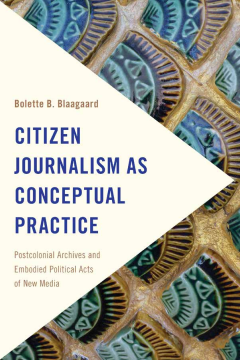
Additional Information
Book Details
Abstract
Citizen Journalism as Conceptual Practice provides a conceptualization of citizen journalism as a political practice developed through analyses of an historical and postcolonial case. Arguing that citizen journalism is first and foremost situated, embodied and political rather than networked and technology-based, the book offers a grounded analysis of the colonial newspaper, The Herald, published in St. Croix (Virgin Islands) 1915-25 by a descendant of enslaved people and independently of the colonial ruler, Denmark.
The analysis is informed by Deleuze and Guattari’s approach to knowledge production and formulates a critical reading of citizens’ and subjects’ mediated political engagements then as well as now. The book discusses current approaches to citizen journalism before turning to The Herald, which is then read against the grain in an attempt to show the embodied politics of colonial history and cultural forms of citizen engagement as these politics evolve in this particular case of journalism
In this fascinating book, Blaagaard breaks new ground in the theory and research of citizen journalism. Her historical insight into the anti-colonial politics of civic journalism in an African-Caribbean community frees citizen journalism from its current links to digital technology and offers a radical rethinking of the relationship between journalism, citizenship and technology. An original and much-needed contribution to journalism studies.
Lilie Chouliaraki, Department of Media and Communications, London School of Economics and Political Science
Bolette B. Blaagaard is Associate Professor of Communications at Aalborg University, Denmark. She is the co– editor of Deconstructing Europe: Postcolonial Perspectives (2012), After Cosmopolitanism (2013), Transformations of Religion and the Public Sphere: Postsecular Publics (2014), among others.
At a time where ‘citizen journalism’ is being celebrated, Bolette Blaagaard has written a thoughtfully measured account in the context of its anticolonial commitments in the Virgin Islands under Danish rule. She spells out in nuanced ways the challenges and burdens, but also the power and potential impacts in the reach for freedom and democratic self-rule. Theoretically grounded, well-versed in the colonial archive, and analytically sharp, this is a compelling contribution to our understanding of citizen journalism historically and contemporarily.
David Theo Goldberg, Director, Humanities Research Institute, University of California
This book provides a radically overdue and rigorous conceptual framework which allows us to think of citizen journalism in fresh and challenging ways. Drawing on postcolonial theory, Citizen Journalism as Conceptual Practice develops an understanding of practices of citizenship as situated, embodied and diverse. It is indispensable reading for anyone interested in the relationship between citizenship and political action.
Karin Wahl-Jorgensen, Director of Research Development and Environment, School of Journalism, Media and Cultural Studies at Cardiff University
Table of Contents
| Section Title | Page | Action | Price |
|---|---|---|---|
| Cover | Cover | ||
| Citizen Journalism as Conceptual Practice | i | ||
| Citizen Journalism as Conceptual Practice: Postcolonial Archives and Embodied Political Acts of New Media | iii | ||
| Contents | vii | ||
| List of Figures | ix | ||
| Acknowledgements | xi | ||
| 1 | 1 | ||
| Shifting Perspectives | 1 | ||
| What Is Citizen Journalism? | 4 | ||
| Situated, Embodied, Political | 8 | ||
| Deleuze on Conceptual Personae and Practice: A Politics of Location | 12 | ||
| Spivak and Onwards: Postcolonial Reflections | 15 | ||
| Braidotti on the \nDeterritorialization of Identity | 17 | ||
| From the Perspective of This Book | 18 | ||
| Note | 21 | ||
| 2 | 23 | ||
| Deconstructing the Citizen Journalist | 23 | ||
| The Participating and Performing Citizen | 26 | ||
| The Citizen, the Subject, the Press | 34 | ||
| Colonialism, Cosmopolitanism and Deterritorializations | 39 | ||
| Citizen Journalism Deconstructed | 43 | ||
| Notes | 44 | ||
| 3 | 45 | ||
| Political Citizen Journalism | 45 | ||
| Jackson’s Political Act | 47 | ||
| The De- and Reterritorialization of ‘the People’ | 53 | ||
| The Telegraph and Objective Cosmopolitanism | 56 | ||
| Embodied Cosmopolitanism | 59 | ||
| Cosmopolitan Poaching in The Herald | 61 | ||
| Political Citizen Journalism | 63 | ||
| Notes | 64 | ||
| 4 | 65 | ||
| Embodied Citizen Journalism | 65 | ||
| Archives, Genealogies and Memory | 68 | ||
| Counter-Memories | 71 | ||
| Strike! | 76 | ||
| The Declaration of Independence | 80 | ||
| What Is a US Citizen? | 83 | ||
| Memories of a Shared History | 85 | ||
| Notes | 87 | ||
| 5 | 89 | ||
| Citizen Journalism and the Politics of Visibility | 89 | ||
| Deterritorializing America/nism | 92 | ||
| Icons, Gestures and Memory | 96 | ||
| Vernacular Expressions: Citizen Media Expressions | 103 | ||
| Notes | 106 | ||
| 6 | 107 | ||
| Conclusions | 107 | ||
| Becoming Citizen Subjectivity | 109 | ||
| Postcolonial Citizen Journalism | 112 | ||
| The Stakes of Shifting Perspectives | 115 | ||
| Notes | 117 | ||
| Bibliography | 119 | ||
| Index | 125 | ||
| About the Author | 131 |
